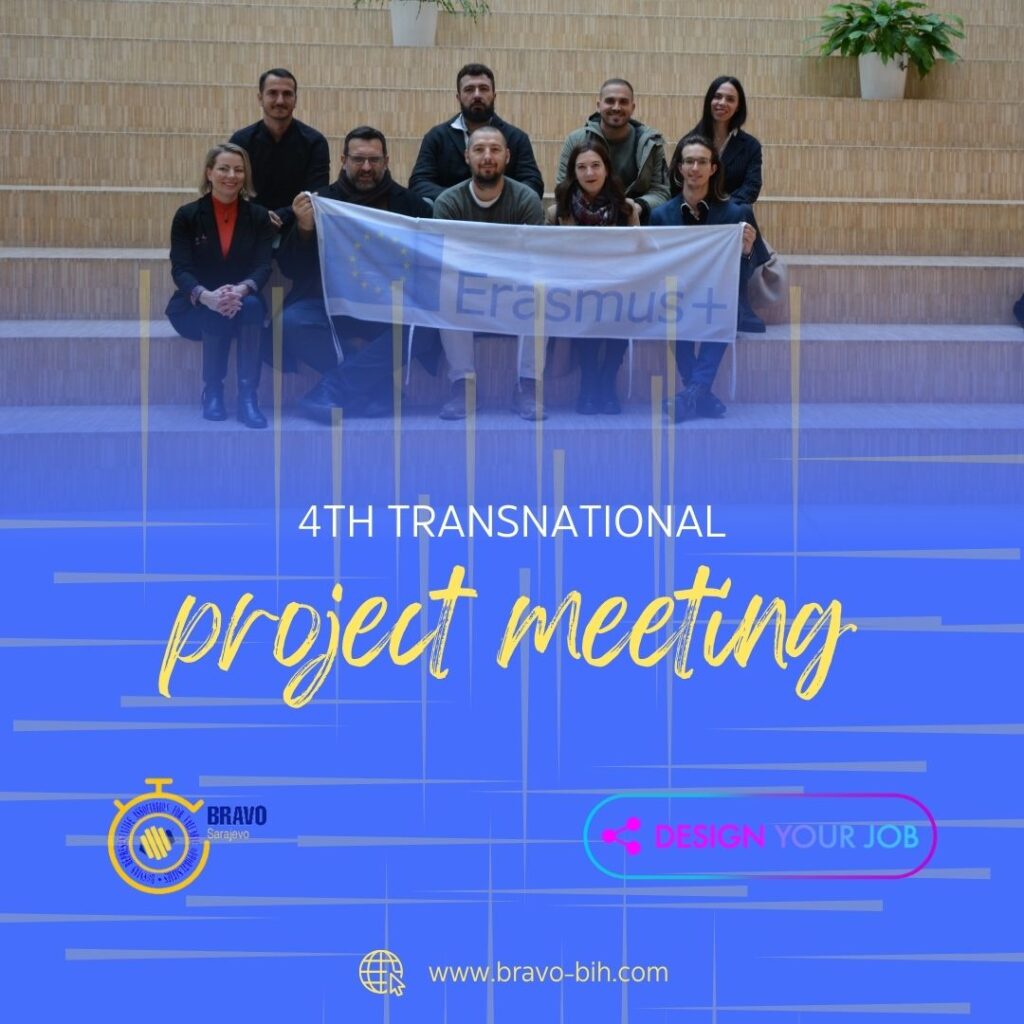
The 4th Transnational Project Meeting of the “Sharing Design Your Job” project recently took place in Riga, Latvia. The meeting involved representatives from partner organizations in Serbia, Italy, Montenegro, Albania, and Latvia, including the director of BRAVO. The purpose of the meeting was to evaluate the progress of the project thus far and plan for upcoming events, with a particular focus on an upcoming conference in Riga in January 2024.
During the meeting, the partners visited potential venues for the conference, discussed the conference program, and addressed logistical and organizational tasks. The final conference will be a one-day event attended by approximately 60 participants from all participating countries. The conference will cover topics such as AI skills, ICT skills mismatches, unemployment, and related issues. The goal is to find solutions and recommendations to address the problems highlighted by the project.
In addition to the project meeting, some partners had the opportunity to participate in celebration events for Latvia’s independence day, including a torch procession and fire and light installations.
The “Sharing Design Your Job” project is a continuation of the “Design Your Job” initiative, which has already completed four projects. The initiative aims to create and test new ICT education programs and methodologies for unemployed or marginalized young people. The project uses NFL methods and mobilities to attract and motivate young people to gain practical competencies that can help them find a job or improve their income situation.
The project offers participants access to shared knowledge of good practices in job searching, a new learning system outside the formal school system, and free technological management tools designed for ICT skills. The project will implement five training courses on topics such as hardware/software manipulation, graphic design, web development, UX design, and digital marketing.
The “Sharing Design Your Job” project is supported and co-funded by the Erasmus+ program.
More about "S-DYJ" project:
The “Sharing Design Your Job” project represents an advanced stage in the evolution of the “Design Your Job” (DYJ) initiative. This initiative, through its journey, has successfully launched four projects, with three receiving funding from the Education, Audiovisual and Culture Executive Agency (EACEA) and one from the Serbian National Agency. Each project under the DYJ banner is aligned with our overarching mission: “To create and refine innovative ICT education programs and methodologies, specifically tailored for the systematic prequalification and re-training of unemployed or marginalized young people.”
Our approach is distinguished by the utilization of Non-Formal Learning (NFL) methods, leveraging mobilities and horizontal priorities of the ERASMUS+ program. This strategy is designed to engage and inspire focused young individuals, equipping them with hands-on, practical competencies. Post-training, our participants are not only job-ready but are also well-prepared to embark on entrepreneurial ventures or enhance their income prospects, often through freelancing.
A unique aspect of our initiative is its geographical focus. As the applicant organization is based in the Western Balkans (WB) region, it is imperative for us to foster close cooperation and mutual understanding within the region. Consequently, each project incorporates partners from both WB and various EU countries, facilitating a rich exchange of knowledge and expertise.
In our current project iteration, we will be building upon the foundations and insights gained from previous DYJ projects. This approach is responsive to both the needs of our target group and the challenges encountered in prior implementations. For instance, we recognized a gap in basic ICT skills among participants; some adept at using graphic design software were unable to manage software or hardware issues. Addressing this, our curriculum will now commence with fundamental hardware and software installation skills, progressing towards more complex subjects like basic graphic design, web development, 3D modeling, and digital marketing.
The project aims to engage up to 100 participants, with a cap of 20 per training topic. Participants have the liberty to apply for one or multiple training modules, subject to an evaluation process to ensure optimal alignment with their desired learning outcomes.
